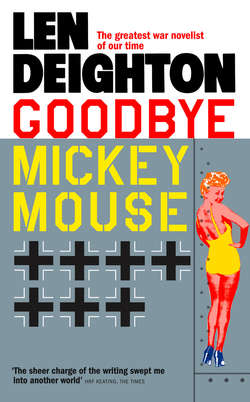Читать книгу Goodbye Mickey Mouse - Len Deighton - Страница 7
Prologue, 1982
ОглавлениеThree buses moved with almost funereal slowness through the narrow winding country lanes. Overhead the sky was dark with rain clouds. The passengers stared out at the meadows and the pretty villages, defaced by advertising, TV antennas and traffic signs, and at the orchards and streams drained of colour by the long months of winter.
The buses did not stop until they reached one large ugly field disfigured by the rusting metal skeletons of old Quonset huts and brick remains. Slashed across this huge field, like some monstrous sign of plague, there was a concrete X. Here and there strenuous attempts had been made to remove this disfigurement, but only tiny pieces had been nibbled from the great cross.
Cautiously the passengers disembarked into the chilly winds that scour the flat East Anglian farmlands. Huddled against the weather, palms outstretched to detect rain in the air, zipped and buttoned to the neck, they formed into small silent groups and wandered dejectedly through the ruined buildings.
They were Americans. They wore brightly coloured windcheaters and tartan hats, they carried cameras and tote bags, none of them was equipped with the heavy sweaters and thick overcoats that England’s climate demands so early in the year. They were white-haired and they were balding, they were florid and they were ashen, they were fat and they were frail, but, apart from a few young relatives, they were all in that advanced stage of life that we optimistically call middle age.
The nervous clowning and the determined laughs of the men demonstrated the tense anxiety behind their movements. Wives watched knowingly as their men frantically searched in the workspace of the echoing old hangar, paced out the shape of a long-vanished barrack hut, peered into dark corners or scratched upon dirt-encrusted windows to find nothing but ancient farm machinery. They’d waited a long time; they’d paid hard-earned money; they’d come a long way to find the man they sought. Sometimes it became necessary to consult an old photo for identification purposes, at other times they listened for half-remembered voices. But as the group grew quieter and, in deference to the cold, returned to the warm buses, it became evident that none of them had discovered the man they all so clearly remembered.
One couple separated from the others. Holding hands like young lovers, they followed a potholed tarmac road that, like a huge ring, surrounded the field, touching the extremities of the crossed runways. The man and woman talked as they took a shortcut along a farm track. They unhooked themselves from blackberry bushes, stepped over cow dung, and picked a wood violet to be pressed flat into a diary and kept as a souvenir. They spoke about the weather and the crops and the colours of the countryside. They spoke about anything except what was uppermost in their minds.
‘Look at the cherry blossom,’ said Victoria, who had not lost her English accent despite thirty years in San Francisco. They both stopped at the orchard gate which once marked the end of Hobday’s Farm and the edge of the airfield.
‘Why did Jamie stay in the bus?’ said the man. He rattled the farm gate. ‘Isn’t he interested in seeing where his father flew from in the war?’
Victoria hugged him. ‘You’re his father,’ she said. ‘You tell me.’
